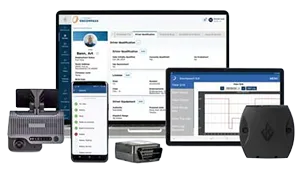FMCSA begins accepting young driver pilot program applications
July 25, 2022
Motor carriers are now able to register to participate in a pilot program that will allow 18- to 20-year-old drivers to operate commercial motor vehicles (CMVs) the require a commercial driver’s license (CDL) in interstate commerce.
On Tuesday, July 26, 2022, the Federal Motor Carrier Safety Administration (FMCSA) began accepting applications to its Safe Driver Apprenticeship Pilot Program.
The pilot program is limited to 3,000 apprentices. It is expected that approximately 1,000 motor carriers will participate in the program. Motor carriers that participate in the program must:
- Complete an application with FMCSA;
- Register an apprenticeship program with the U.S. Department of Labor (DOL);
- Submit monthly data on an apprentice’s driver activity, safety outcomes, and any additional supporting information; and
- Verify that proposed apprentices meet all requirements to participate.
Carriers participating in the program will be publicly identified on FMCSA’s website.
The program’s requirements include:
- A 120-hour probationary period, including at least 80 hours spent driving, followed by a 280-hour probationary period of on-duty time, including at least 160 hours driving.
- The apprentice must show competency in a dozen maneuvers and skills, including backing, pre-trip inspections, fueling, and coupling and uncoupling.
- The apprentice may only drive a vehicle with:
- An automatic or semi-automatic transmission and active braking collision mitigation system,
- A forward and rearward facing video event capture system, and
- A governed speed of 65 mph.
- An apprentice must be accompanied in the passenger seat of the CMV by an experienced driver. The experienced driver must be at least 26-years old, have a minimum of at least five years of experience, and not have any violations in the last two years.
To qualify for participation, the motor carrier must meet specific standards, including:
- Having proper operating authority, if required, and registration;
- Having at least the minimum levels of financial responsibility required by the FMCSRs;
- Not having a high or moderate risk motor carrier as defined by FMCSA;
- Not having a conditional or unsatisfactory safety rating;
- Not having any open enforcement actions (Imminent Hazard, Operations Out-of-Service (OOS) Orders) in the previous six years;
- Not having a crash rate above the national average; and
- Not having a driver or vehicle OOS rate above the national average.
Approval for participation in the pilot program will also be dependent on the motor carrier’s agreement to comply with all pilot program procedures, including the monthly submission of data.
FMCSA will monitor motor carrier and driver performance throughout the pilot program to ensure safety. Motor carriers may be disqualified from the pilot program at any time for various reasons, including not meeting the criteria listed above.
J. J. Keller's FREE SafetyClicks™ e-newsletters bring quick-read transportation, industrial & manufacturing, and human resources compliance news right to your inbox.
July 25, 2022
Author{not populated}
TypeIndustry News
IndustriesTransportation
Related TopicsCommercial drivers license CDL
Driver qualifications
Governing BodiesFederal Motor Carrier Safety Administration (FMCSA), DOT
Citationsr49CFR383.71","r49CFR381SubpartD



